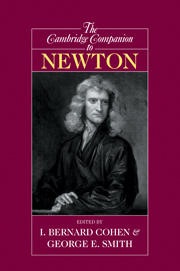Book contents
- Frontmatter
- Introduction
- 1 Newton's philosophical analysis of space and time
- 2 Newton's concepts of force and mass, with notes on the Laws of Motion
- 3 Curvature in Newton's dynamics
- 4 The methodology of the Principia
- 5 Newton's argument for universal gravitation
- 6 Newton and celestial mechanics
- 7 Newton's optics and atomism
- 8 Newton's metaphysics
- 9 Analysis and synthesis in Newton's mathematical work
- 10 Newton, active powers, and the mechanical philosophy
- 11 The background to Newton's chymistry
- 12 Newton's alchemy
- 13 Newton on prophecy and the Apocalypse
- 14 Newton and eighteenth-century Christianity
- 15 Newton versus Leibniz: from geometry to metaphysics
- 16 Newton and the Leibniz-Clarke correspondence
- Bibliography
- Index
14 - Newton and eighteenth-century Christianity
Published online by Cambridge University Press: 28 May 2006
- Frontmatter
- Introduction
- 1 Newton's philosophical analysis of space and time
- 2 Newton's concepts of force and mass, with notes on the Laws of Motion
- 3 Curvature in Newton's dynamics
- 4 The methodology of the Principia
- 5 Newton's argument for universal gravitation
- 6 Newton and celestial mechanics
- 7 Newton's optics and atomism
- 8 Newton's metaphysics
- 9 Analysis and synthesis in Newton's mathematical work
- 10 Newton, active powers, and the mechanical philosophy
- 11 The background to Newton's chymistry
- 12 Newton's alchemy
- 13 Newton on prophecy and the Apocalypse
- 14 Newton and eighteenth-century Christianity
- 15 Newton versus Leibniz: from geometry to metaphysics
- 16 Newton and the Leibniz-Clarke correspondence
- Bibliography
- Index
Summary
You will be very able to deal with Sr Isaac, and I shall be glad to leave Him in such good hands. He is a man of such scope, and his Authority so justly celebrated in some things, that his name is of great weight in other matters, where He was plainly out of his element, and knew little of what He was talking about. Besides his countenancing Arianism, in the piece referred to, He has given too much encouragement to Popery by his large concessions, such as our best Protestant writers, att the time of K[ing]. James as well as before, would never make.
Isaac Newton's Observations upon the Prophecies of Daniel, and the Apocalypse of St. John, prepared for the press from his manuscripts by his nephew Benjamin Smith, was published in two editions in London and Dublin in 1733. According to Richard S. Westfall, Newton's finest twentieth-century biographer, the author “had cleansed his Observations” and his heirs “could publish the manuscript without concern.” Yet one might be permitted to wonder whether either the actual or the intended reception of Newton's posthumous work was as uncontroversial as it has seemed to late twentienth-century eyes. The book was dedicated to Peter King, baron of Ockham, the lord chancellor, who had defended Newton's sometime disciple, William Whiston, during his trial for heresy in July 1713. Although Whiston later fell out with King, he nevertheless continued to maintain that King's youthful writings on the primitive Church supported the Arian position for which he had himself been condemned. King was also the dedicatee of other works of dubious theological orthodoxy, such as Daniel Mace's attempted revision of the New Testament.
- Type
- Chapter
- Information
- The Cambridge Companion to Newton , pp. 409 - 430Publisher: Cambridge University PressPrint publication year: 2002
- 4
- Cited by



